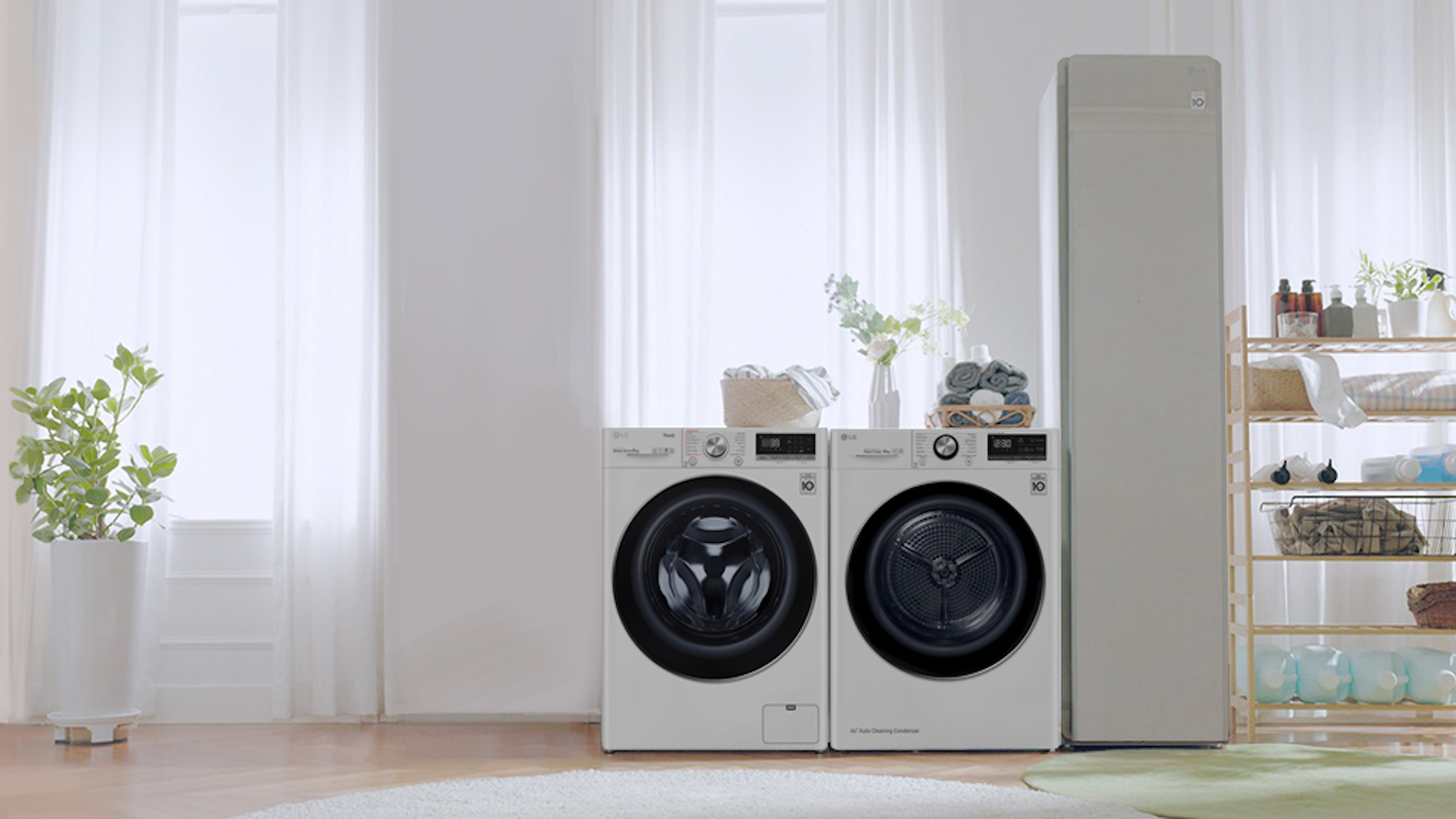Do washer dryers work as well as separates?
Does a washer dryer clean and dry as well as a separate washing machine and tumble dryer? We explain what to expect


Get all the latest news, reviews, deals and buying guides on gorgeous tech, home and active products from the T3 experts
You are now subscribed
Your newsletter sign-up was successful
Not all households have the space for one of the best washing machines and best tumble dryers as separate appliances. If you have a small kitchen or utility room, a combined washer dryer may be your only practical option.
The best washer dryers do the job of two machines – it can even be set to wash and dry a batch of laundry in one go – and is a great choice for flats, smaller new builds, houseboats, mobile homes and narrowboats. Even if you have the space to accommodate two 60cm-wide appliances, eschewing two separate machines in favour of just one may allow space for one of the best dishwashers – and who could blame you for taking that route?
But does a single 2-in-1 machine provide the same level of efficiency as two separate machines that are dedicated to their own specific tasks? Let’s have a look at both systems in more detail and see where one machine may be better than two, and vice versa.
Washer dryer vs separates: Upfront cost
You could feasibly buy a single washer dryer for around the same price as a just a regular washing machine. However, we would always advise going for the best washer dryer you can afford, because chances are that a cheap washer dryer won’t perform as well as a budget-priced separates system in either discipline, especially the drying cycle (more on that below).
Get all the latest news, reviews, deals and buying guides on gorgeous tech, home and active products from the T3 experts
After all, it doesn’t take a degree in physics to deduce that a single machine that performs the tasks of two would need to be as good as both of those machines in each discipline in order to achieve the same level of efficiency. And when it comes to washer dryers, that means spending more than you would on a pair of separates.
Washer dryer vs separates: Footprint
Footprint is the one key area where a washer dryer beats a separates system hands down. Like any large domestic appliance, all washer dryers, washing machines and tumble dryers measure up to 60cm in width and depth. If you only have the space for one unit, a washer dryer is clearly the best option.
However, if you’re prepared to lose the cupboard space above the area where you would otherwise put a washer dryer, you could install a strong shelf and place a tumble dryer on top of a washing machine. That’s what quite a few householders do – this writer included. In fact, as long as there is some plumbing and drainage in the immediate vicinity, a stacked system like this can be put in several areas of the home.
Washer dryer vs separates: Drum size
All washer dryers list two different drum capacities – for instance 8kg/5kg – so if you want to enjoy the convenient benefits of having a laundry load washed and dried in one fell swoop, you should concentrate on the lower drum capacity figure.
This is because the drying sequence requires more space in the drum for the clothes to freely tumble about so all the items are properly dried. If you simply ignore the manufacturer’s recommendations and load it to the hilt, the laundry will fail to dry evenly and everything will be either as creased as corrugated roofing or very damp.
Conversely, with a separates system, you can enjoy the benefits of being able to dry everything that was put in the washing machine, as long as the tumbler dryer's drum is the same size. You can and even start a second wash while the first is still drying.
Washer dryer vs separates: Convenience
When it comes to convenience, the washer dryer clearly walks it. This is because you can program it to wash and dry in one long sequence. Hence you can load a washer dryer with a bunch of dirty garments and simply leave it to its own devices. On your return everything will be spotlessly clean and dried. Granted, avoiding the need to get off one’s posterior and physically move the washing from one machine to the other is not a gigantic hardship generally, but it's difficult to do if you're not even in the house. Not a problem with a washer dryer – convenience of this nature is one of the key benefits of them.
Washer dryer vs separates: Washing performance
Washer dryers come in a variety of drum sizes – from 7kgs to 12kgs – but these higher figures are only for the washing sequence. Thankfully, the washing cycle in most mid-priced washer dryers produces very similar results to a standalone mid-priced washing machine.
Also, most washer dryers sport the same level of programs as a standard washing machine – cotton, wool, synthetics and quick wash, etc – while some models, such as the best Samsung washer dryers also include functions like steam and bubble-soak technology.
Many washer dryers will also attain a spin-dry speed of up to 1,400rpm and that’s an especially useful stat because it means the clothes will be better prepared for the drying sequence.
Washer dryer vs separates: Drying performance
In a nutshell, a washer dryer isn’t as good at drying as a proper tumble dryer. Even when you stick rigidly to the manufacturer’s drum capacity regulations, a washer dryer can sometimes take longer to perform the same task and many users say the clothing still isn’t as dry as they’d have liked.
This is arguably the result of washer dryers having smaller condensers than most tumble dryers. On average, washer dryers take up to two hours to dry a smaller amount of clothing than a full-sized tumble dryer. That’s just the way they are.
If speed and capacity are what you need, there's no question a separate unit will do the job better.
Washer dryer vs separates: Running costs
When it comes to energy consumption, washer dryers don’t enjoy the same rosy ratings as their counterparts, so you can expect to pay a bit more in the long term on electricity and water costs.
One of the problems is that energy-efficient heat pump technology as used in many tumble dryers is hard to come by in washer dryers. In fact, to date we know of only one AEG washer dryer equipped with a heat pump but even that’s been discontinued.
Heat pump tech has revolutionised the way tumble dryers work, saving a horde of money in energy use in the process. Hopefully we’ll see heat pumps fitted to most washer dryers in the not too distant future.
Washer dryer vs separates: Repairs
If your washing machine has a mechanical or electronic issue, you can at least still use the tumbler to dry an emergency hand wash. And if the dryer has a breakdown you can still wash your clothes and hang them up in the bathroom or outside if it’s a sunny day.
But if your washer dryer develops a fault, chances are both functions will be out of action. By their very nature, washer dryers are generally more expensive to fix and there’s an argument that the sheer amount of extra parts involved in their manufacture means there’s more chance of a breakdown, so bear that curveball in mind.
Washer dryer vs separates: Other options
If lack of space is forcing your hand into getting a washer dryer but you are worried about the efficiency of its drying function, you could opt for a standard washing machine and a dehumidifier instead. Most dehumidifiers like those conveniently listed in our guide to the best dehumidifiers have a laundry drying function, too.
Washer dryer vs separates: Verdict
If you simply don’t have the space for two machines or are unable to stack them on top of each other, a washer dryer is your best bet. However, if you’re choosing a washer dryer simply because you like the idea of a 2-in-1 machine, we would advise against it simply because the majority of washer dryers don’t perform as well as most separates, especially when it comes to the drying function.
Also, the restrictions placed on useable drum space may soon become a hindrance and you may start wishing you’d plumped for a two machine setup in the first place.

Derek (aka Delbert, Delvis, Delphinium, Delboy etc) specialises in home and outdoor wares, from coffee machines, white appliances and vacs to drones, garden gear and BBQs. He has been writing for more years than anyone can remember, starting at the legendary Time Out magazine – the original, London version – on a typewriter! He now writes for T3 between playing drums with his bandmates in Red Box (redboxmusic).